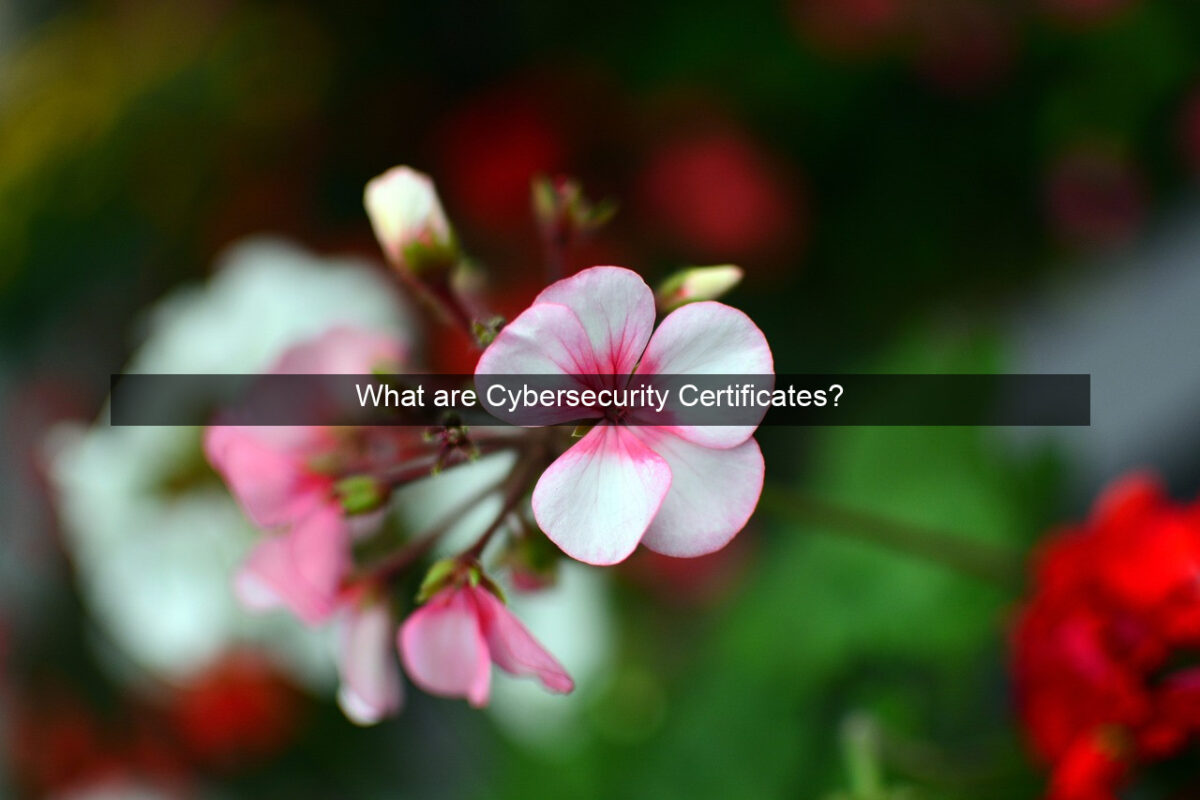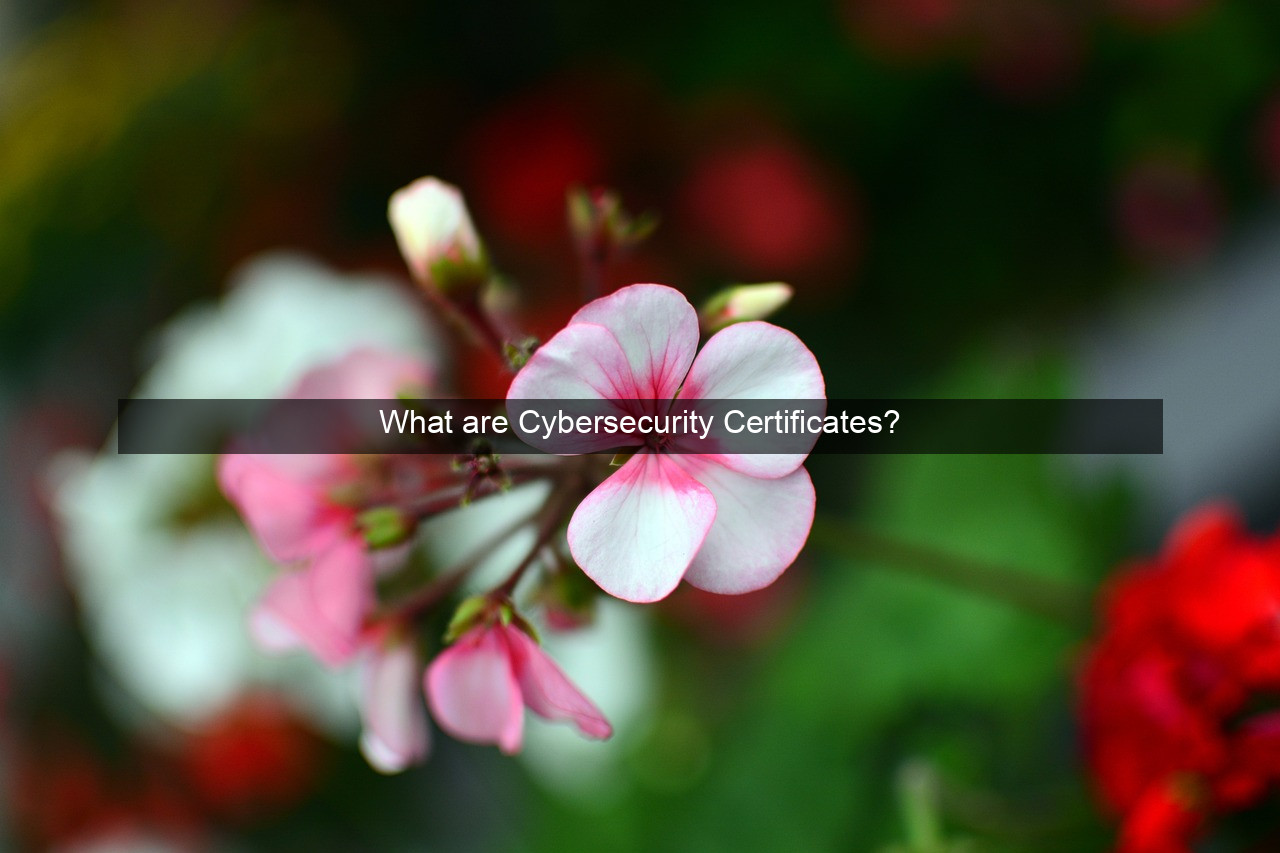What are Cybersecurity Certificates?

- What are Cybersecurity Certificates?
- Types of Cybersecurity Certificates
- Entry-Level Certifications
- Mid-Level Certifications
- Advanced Certifications
- Benefits of Earning a Cybersecurity Certificate
- Career Advancement
- Increased Earning Potential
- Enhanced Credibility and Recognition
- Choosing the Right Cybersecurity Certificate
- Identify Your Career Goals
- Research Available Certifications
- Consider Your Experience Level

In today’s interconnected world, where data breaches and cyberattacks are increasingly common, the demand for skilled cybersecurity professionals has skyrocketed. Cybersecurity certificates offer a focused and efficient way to gain expertise in this critical field. They provide individuals with the knowledge and skills needed to protect sensitive information and digital assets from ever-evolving threats. From network security to ethical hacking, these certifications validate specific competencies and can significantly enhance career prospects. Earning a cybersecurity certificate demonstrates a commitment to professional development and a dedication to staying ahead of the curve in this dynamic landscape. This article will delve into the world of cybersecurity certificates, exploring their benefits, various types, and how they can help you advance in your cybersecurity career.

Types of Cybersecurity Certificates
Entry-Level Certifications
For those new to cybersecurity, entry-level certifications provide a foundational understanding of key concepts. These certificates often cover topics like network security fundamentals, basic cryptography, and common security threats. They are a great starting point for individuals looking to break into the field.
These certifications can help build a solid base for further specialization. They often focus on general security principles and best practices, preparing individuals for more advanced studies.
Entry-level certifications can also demonstrate a commitment to cybersecurity to potential employers. Even without extensive experience, holding a relevant certificate can show initiative and a willingness to learn.
Mid-Level Certifications
Mid-level certifications cater to professionals with some experience in cybersecurity. These certificates delve deeper into specialized areas like penetration testing, incident response, and security auditing. They equip individuals with the practical skills needed to handle more complex security challenges.
Building on the foundation laid by entry-level certifications, mid-level options allow professionals to hone their skills in specific domains. This specialization can be crucial for career advancement.
Mid-level certifications often require practical experience or the completion of prerequisite certifications. This ensures that candidates possess a certain level of competency before tackling more advanced topics.
Advanced Certifications
Advanced cybersecurity certificates are designed for seasoned professionals looking to demonstrate mastery in their chosen field. These certifications often focus on highly specialized areas like cloud security, malware analysis, and digital forensics. They validate expertise and leadership potential.
These certifications often involve rigorous examinations and require significant practical experience. Earning an advanced certification signifies a high level of proficiency and commitment to the field.
Advanced certifications can open doors to senior roles and leadership positions within cybersecurity teams. They demonstrate a deep understanding of complex security concepts and the ability to apply them in real-world scenarios.
Benefits of Earning a Cybersecurity Certificate
Career Advancement
In a competitive job market, cybersecurity certificates can provide a significant edge. They demonstrate specialized skills and a commitment to professional development, making candidates more attractive to potential employers.
Certifications can help professionals stand out from the crowd and advance their careers. They can lead to promotions, higher salaries, and access to more challenging and rewarding opportunities.
Many organizations prioritize candidates with relevant certifications when filling cybersecurity roles. This is because certifications validate specific skills and knowledge that are essential for success in the field.
Increased Earning Potential
Cybersecurity professionals are in high demand, and certifications can further boost earning potential. Holding a recognized certificate can command higher salaries and better compensation packages.
Employers are often willing to invest more in certified professionals, recognizing the value they bring to the organization. This translates to higher earning potential and greater financial stability.
The return on investment for cybersecurity certifications can be significant. The cost of obtaining a certificate is often outweighed by the increased earning potential it unlocks.
Enhanced Credibility and Recognition
Cybersecurity certificates provide a tangible way to demonstrate expertise and build credibility within the industry. They offer a standardized measure of competency that is recognized by employers and peers alike.
Holding a relevant certification can enhance professional reputation and open doors to new opportunities. It signals a commitment to staying up-to-date with the latest security trends and best practices.
Certifications can also provide a sense of personal accomplishment and professional validation. They represent a significant investment of time and effort and demonstrate a dedication to continuous learning.
Choosing the Right Cybersecurity Certificate
Identify Your Career Goals
Before pursuing a cybersecurity certificate, it’s essential to define your career aspirations. Different certificates cater to different career paths, so choosing one aligned with your goals is crucial.
Consider your interests and long-term career objectives. Do you want to specialize in network security, ethical hacking, or digital forensics? Identifying your area of focus will help you choose the most relevant certificate.
Research different cybersecurity roles and the certifications typically required or preferred for those positions. This will give you a clear understanding of the qualifications needed to achieve your career goals.
Research Available Certifications
Once you have a clear understanding of your career goals, research the various cybersecurity certificates available. Compare their content, prerequisites, and industry recognition.
Look for certifications offered by reputable organizations and recognized within the cybersecurity community. Consider factors like cost, exam format, and study resources available.
Read reviews and testimonials from other professionals who have earned the certifications you are considering. This can provide valuable insights into the certification process and its benefits.
Consider Your Experience Level
Choosing a certificate appropriate for your experience level is important. Starting with an entry-level certification is recommended for those new to the field, while more experienced professionals can pursue mid-level or advanced certifications.
Don’t be afraid to start with the basics and build your knowledge gradually. Even experienced professionals can benefit from refreshing their foundational knowledge before tackling more advanced topics.
Consider the prerequisites for each certification and ensure you meet the requirements before enrolling. Some certifications may require prior experience or the completion of other certifications.
| Certification Type | Example Certifications | Target Audience |
|---|---|---|
| Entry-Level | CompTIA Security+, Cisco CCNA Security | Individuals new to cybersecurity |
| Mid-Level | CISSP, CEH, CISM | Experienced cybersecurity professionals |
| Advanced | CCIE Security, SANS GIAC certifications | Highly specialized security experts |
- Research different cybersecurity roles.
- Consider your interests and long-term career objectives.
- Identify your area of focus.
In conclusion, cybersecurity certificates are valuable assets for anyone pursuing a career in this dynamic field. They offer a structured path to acquiring specialized knowledge and skills, enhancing career prospects, and increasing earning potential. By carefully selecting a certificate aligned with your career goals and experience level, you can invest in your professional development and contribute to the ever-growing demand for skilled cybersecurity professionals.
What are the benefits of getting a cybersecurity certificate?
Cybersecurity certificates can enhance your career prospects, increase your earning potential, and provide industry recognition for your specialized skills.
How do I choose the right cybersecurity certificate for me?
Consider your career goals, research available certifications, and choose one that aligns with your experience level.
Are cybersecurity certificates expensive?
The cost of cybersecurity certificates varies depending on the specific certification and the training provider. However, the potential return on investment in terms of increased earning potential can be significant.
How long does it take to earn a cybersecurity certificate?
The time required to earn a certificate varies depending on the specific certification, your prior experience, and the intensity of your study efforts.



